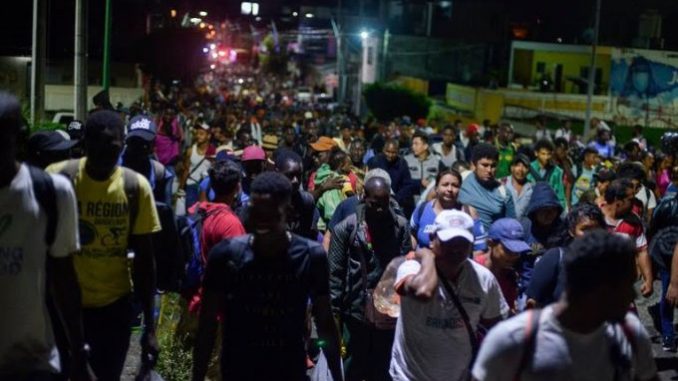
TAPACHULA, Mexico (AP) — Mexican officials broke up a caravan of around 2,000 migrants that had set out from southern Mexico Saturday in the hopes of reaching the United States, amid increasing difficulty obtaining permission to pass through Mexico.
Many of the migrants who departed from Tapachula, Chiapas early in the morning had been held up in this city just north of Guatemala for weeks or months, awaiting residency or transit papers from Mexican authorities. The migrants are originally from Central America, Africa and the Caribbean.
They left their home countries sometimes because of violence, or simply in search of a better life.
“I want to pass through Mexico, I don’t want to live here,” said Amado Ramirez, a migrant from Honduras who said he had been living on the streets of Tapachula with his young children and wife, hoping for a transit visa from Mexican officials. “We’re at a standstill.”
Men carried large, sagging backpacks while women carried children on their shoulders and parcels on their heads.
The group trudged about 24 miles ( 40 kilometers) northwest along a highway under the supervision of human rights officials before a large contingent of federal police and national guardsmen blocked their path. Some ran, while others turned themselves over to authorities.
“This caravan no longer exists,” said migrant rights advocate Irineo Mujica, who was trying to help a migrant from the caravan locate a child when he spoke to The Associated Press.
Hundreds of African migrants, in particular, have been stuck for months in Tapachula, where they say immigration authorities have stalled on giving them residency or transit papers. Almost all of them want to seek asylum in the United States, rather than stay in Mexico.
The migrants have engaged in scuffles with police at the Tapachula immigration offices in recent weeks. Mexico says they can stay in southern Mexico, or leave by the southern border, but the migrants want documents that will allow them to reach the northern border.
Mexico frequently repatriates, by plane, migrants from countries such as Cuba and Honduras.
However, deportations are more difficult for migrants from faraway countries in Africa, some of which lack the infrastructure to handle repatriations.
Maureen Meyer, director for Mexico and migrant rights at the Washington Office on Latin America, said that enforcement around Tapachula has made it very difficult for migrants to head north undetected. Hence the decision to strike out en masse Saturday.
“What you had were thousands of people that were feeling very much trapped in Tapachula,” she said.
Under pressure from the U.S., Mexico has practically stopped issuing visas for migrants to pass through the country. Migrants marooned in Tapachula faced the option of turning back across Mexico’s southern border, trekking north clandestinely or applying for asylum in Mexico – a country that many feel is unsafe or unattractive because of language and cultural differences.
On Friday, a migrant from the African country of Cameroon was found dead after a fishing boat he was in capsized off the Pacific Coast northwest of Guatemala. Two more migrants were missing, while another seven men and a woman were brought to a hospital.
Tens of thousands from Cameroon have been displaced in recent months amid an armed conflict between the country’s English-speaking population and its Francophone majority-government.
“These people are desperate, fleeing severe conflict and repression,” said Meyer.
The boat trip up Mexico’s Pacific Coast may have been motivated by a desire to avoid being corralled in Tapachula.
The Collective for Observation and Monitoring of Human Rights in Southeastern Mexico, an aid group, said local authorities refused to allow them to speak with survivors of the shipwreck.
*story by AOL